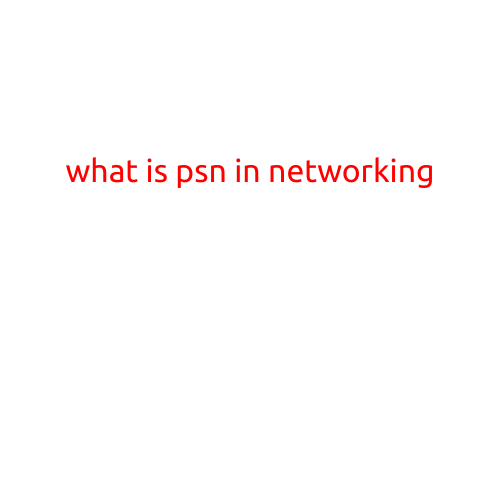
What is PSN in Networking?
In the ever-evolving landscape of computer networking, protocols and technologies are constantly being developed and refined to improve communication between devices. One such technology is PSN (Packet Sniffing Network), a valuable tool for network administrators and security professionals alike. In this article, we’ll delve into the world of PSN and explore what it means for networking.
What is Packet Sniffing?
Before we dive into PSN, it’s essential to understand what packet sniffing is. Packet sniffing, also known as network monitoring or network snooping, is the process of capturing and analyzing data packets as they travel across a network. This allows network administrators to monitor network traffic, identify potential issues, and troubleshoot problems.
What is PSN?
PSN, short for Packet Sniffing Network, is a type of network that allows packets to be captured and analyzed. PSN is essentially a network that is designed to facilitate packet sniffing, providing a means for administrators to monitor network traffic and gather valuable information.
How does PSN work?
PSN works by creating a network infrastructure that allows packets to be captured and analyzed. This is achieved through the use of specialized software and hardware, such as network sniffers and packet capture tools. These tools are designed to capture packets as they travel across the network, and then analyze them to gather information.
Benefits of PSN
The benefits of PSN are numerous. Some of the most significant advantages include:
- Network Troubleshooting: PSN allows administrators to quickly identify and troubleshoot network issues, reducing downtime and improving overall network performance.
- Network Security: PSN provides valuable insights into network traffic, allowing administrators to identify potential security threats and take action to prevent them.
- Network Optimization: PSN enables administrators to monitor network traffic and optimize network performance, ensuring that the network is running at maximum efficiency.
- Compliance: PSN can help organizations comply with regulatory requirements by providing a means to monitor and track network traffic.
Challenges and Limitations
While PSN offers many benefits, there are also some challenges and limitations to consider. Some of the most significant challenges include:
- Privacy Concerns: PSN can potentially compromise network privacy, as it requires the capture and analysis of packets.
- Network Traffic Overload: PSN can lead to network traffic overload, if not properly managed.
- Security Risks: PSN can also introduce security risks, if not implemented correctly.
Conclusion
In conclusion, PSN is a valuable technology that allows network administrators to monitor and analyze network traffic. By understanding what PSN is and how it works, organizations can take advantage of its benefits and improve overall network performance and security. While there are challenges and limitations to consider, the benefits of PSN make it an essential tool for any network administrator or security professional.





